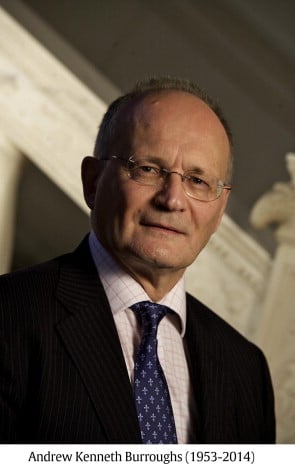
PROFESSOR ANDREW K. BURROUGHS (1953-2014)
Professor Andrew K. Burroughs, Andy Burroughs, as the hepatological community universally named him, died prematurely when the spring was just willing to start, bringing all his family and friends back into a cold, dark winter. This was how we all felt when the news that Andy had passed away spread all over the world. Yet, this is not how Andy wanted us to feel. He would rather wanted us to remember him with a smile on his face, celebrating his last joke, his last paper, the success of one of his fellows, or just celebrating life. With this in mind, I would like to comment on several aspects of his life as a physician, a scientist, a mentor, a teacher, and a family man.
Andy was above anything else, a dedicated clinician with a passion for his work, one of these doctors that patients love as they know that he really cares for them – not just for their liver – who is a proficient professional and also acts like a friend taking their suffering as a personal problem; who on top of that still finds time to ask for their family and act as a counselor for all of them. His stature as a clinician is recognized by all his colleagues, continuing the trajectory of excellence in clinical hepatology started at the Royal Free Hospital by late Dame Sheila Sherlock, who was Andy’s proud mentor, and afterwards by Prof Neil McIntyre. As a modern doctor, however, Andy was not a traditional clinician anchored in his clinical skills, but contributed enormously to evidence-based medicine. This field, especially in the areas of portal hypertension and liver transplantation, is where hepatology owes the most to his efforts. Much of the progress and success of new treatments for portal hypertension has been possible thanks to his continued contributions to the design and analysis of clinical trials and meta-analyses.
He was the most critical reviewer of these studies, what he used to describe lightly as playing the role of devils’ advocate, which he did remarkably well! Anyhow, he was never aprioristic and made up his mind every time there was confirming evidence overcoming his criticisms. This is well illustrated by the fact that his first paper in the New England Journal of Medicine was to report lack of efficacy of beta-blockers in preventing variceal rebleeding (this was actually when I met Andy for the first time), to become later the most enthusiastic advocate of what we together named as “the aspirin of hepatologists”. After portal hypertension and its complications (mainly bleeding and infections), liver transplantation was the area to which he contributed the most and where he succeeded to establish pivotal cooperative studies (as the TMC study with John O’Grady). Last but not least, he did important contributions in primary biliary cirrhosis and hepatocellular carcinoma, among many others that are impossible to comment as his work is gigantic, with 628 PubMed documents under his name!
Andy was an example of what a mentor should be. He had over 100 fellows from all over the world, many of them turned to be close friends for the rest of their lives, and all deeply admire him for his honesty, intelligence, proximity, and generosity. Reading what they write about him makes you realize how much he has been loved by all of them, who usually refer to Andy as my second father; my family while in the UK; an example for my life; the most influential person I met; somebody I’ll give an arm and a leg for!
It is my bias to think that all these qualities were reunited in a single man thanks to the interaction of his genetic background that made him a perfect mix of a British gentleman and a light hearted very sympathetic Italian, showing either of these personalities (sometimes at unexpected moments).
As he used to say, no man is an island, and it is impossible to understand his career without the help of his many trainees and colleagues, especially his long-standing co-workers and friends Keith Roles and David Patch. I will not risk mentioning anyone more, as I very much risk omitting (and offending) too many people by involuntarily forgetting to name them. Suffices to say that I do not know anybody who had met Andy once and was not willing to meet him again and again.

